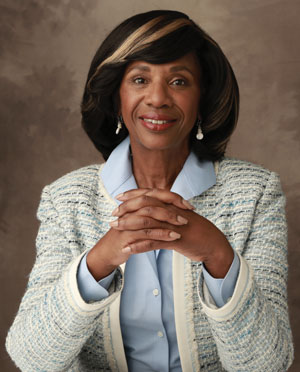Protect the Vote, Promote the Vote: New voting laws can infringe on a critical constitutional right

Photo of ABA President Paulette Brown by Marc Hauser.
The right to vote appears in the Constitution more than any other single right. It is mentioned five times in five different amendments, as compared to the freedoms of speech, religion and assembly, which are all mentioned just once.
But rather than a constitutional right, voting is often treated as a privilege. Laws that have proliferated across America, erecting hurdles between citizens and the voting booth, do not adequately respect the arduous road to voting rights that has been traveled by many throughout our history.
African-Americans did not receive the right to vote until after the Civil War, when the 15th Amendment was ratified in 1870. Women were disenfranchised until 1920 when the 19th Amendment was ratified. Even constitutional amendments did not stop years of laws that continued to suppress voting rights of large swaths of entitled voters.
In March 1965, President Lyndon Johnson told the nation: “Every American citizen must have an equal right to vote. There is no reason which can excuse the denial of that right. There is no duty which weighs more heavily on us than the duty we have to ensure that right.”
He warned that “every device of which human ingenuity is capable” had been used to deny this right. The Voting Rights Act, which prohibited discrimination in voting, passed five months later, but Johnson’s warning has unfortunately proven prophetic 50 years later.
Seventeen states have new voting restrictions in place for the 2016 presidential election, according to research by the New York University School of Law’s Brennan Center for Justice. Many states enacted these laws after the U.S. Supreme Court’s 2013 decision, Shelby County v. Holder, struck down a provision of the Voting Rights Act that required jurisdictions with histories of racial discrimination to clear any voting changes with the federal government before implementation.
North Carolina adopted laws one month after Shelby, making voting and registering to vote harder for some. A federal court in Texas found that 608,470 registered voters didn’t have the forms of identification that the state now requires.
Early studies of such laws show they more adversely affect people of color, the elderly and people in rural areas. A 2016 study of voter ID laws by the University of California-San Diego found the gap in voter turnout between whites and both Latinos and blacks in states requiring voter IDs is twice as large as states without the laws.
Nearly one in five citizens over 65—about 8 million—lack a current, government-issued photo ID, a 2006 Brennan Center study found. And in 2012, the Brennan Center found that more than 10 million eligible voters in voter ID law states live more than 10 miles from a state ID-issuing office that is open more than two days a week.
Supporters of stricter voting laws claim they are needed to combat in-person voter fraud, but critics say the laws are a bad solution to a nonexistent problem. An analysis by the Washington Post found that among more than 1 billion votes cast in elections from 2000-14, just 31 credible incidents of voter fraud would have been prevented by ID laws. Yet as many as 11 percent of eligible voters—some 21 million people—lack the requisite ID.
The issues of new voting laws are working through several courts and will find their way to the U.S. Supreme Court. Congress has produced bipartisan bills to restore stronger oversight to the Voting Rights Act, but they have not been given a vote.
As November’s presidential election approaches, we, as lawyers, must continue to do good with the privilege our license affords us and do all we can to ensure that the voting process is fair and accessible. Lawyers can volunteer as nonpartisan poll workers or help citizens through the registration process. There is information on the Voting and Elections page of the Division for Public Education at americanbar.org.
Without regard to our individual political proclivities, all eligible voters should be able to vote and more people should be encouraged to register and vote. Voting should be easier, not harder. Too many people fought for too many years for everyone to have this right.



